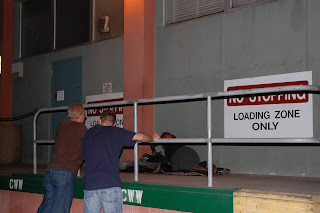At Fifth Street and Broadway in Oakland, the freeway can be heard nearby. The night is clear, but crisp and most people are off of the streets. A group of people are parked right on the corner, however, and they unload what appears to be an endless supply of grocery bags brimming with food.
The county Coroner’s Office is just one of many government buildings in the area, the department of Public Health is right next door, and county probation department is just across the street to the south, and to the east is a police vehicle depot.
The streets are deserted in this part of town by 8 p.m. Except for the few night joggers getting their laps in around Lake Merritt and the stragglers who hurry home from a long day of work, the streets are mostly empty. Even the city’s homeless have found a nook or cranny to pack into for the night. Regardless of who ventures out during the twilight hours, no one stays out on the street long. Those that don’t have business to attend to dip into a nearby bar or restaurant and enjoy the cool Oakland nights in safety.
These city-owned buildings appear closed from the street, but venture into the alleyways and the life found there tells another story.
On the steps, the back doors, the loading terminals, the benches; it seems everywhere that could be remotely comfortable on the concrete has an inhabitant. The Body Shop is not merely where the dead are taken, but where the homeless go to sleep.
“Alright get me a ‘Scotty dog’ with some barbecue sauce!” Mike Mancini can be heard yelling to the remainder of the group still huddled at the parked cars. It’s Friday night and Regeneration Church is out performing its biweekly street ministry.

Scott Vorie, the progenitor of the “Scotty dog,” hands Mancini a hot dog and pours a healthy dab of sauce on it. Mancini hands the hot dog to a nearby homeless resident of the block.
Mancini walks off with the hot dog in hand and a grocery bag, he approaches a sleeping homeless man on an unlit section of the coroner’s building.
Vorie meanwhile approaches another sleeping resident of the block. He gently wakes the man up and asks him his name and if he would like something to eat.
The man responds affirmatively and responds that his name is Michael.
“Is there anything we can pray for you for, Michael?” Vorie asks after placing the bag of food at the end of the sleeping bag and giving the groggy man a hot dog.
Vorie leans over the railing to face the bundled up man, a group of fellow church members huddle behind him and on the steps close by.
After a brief prayer, Vorie hands the man a pamphlet and explains that on Sunday a hot breakfast will be waiting for him nearby at their church. He walks away, but not before asking the man if there is anyone else nearby who might be in need of food.
Street Ministry.
Food is secondary for members of Regeneration; selling the gospel to the downtrodden is their primary aim.
Tom Green, the leader of this ragtag group of missionaries explains that they use their Friday night excursions to encourage the homeless to take advantage of the church’s Sunday breakfasts which are followed by church service.
“It’s about letting them know there is hope in their lives,” Green said. “It’s not about the food. The food is just an entrance to the conversation.”
The homeless sleep just about anywhere in Oakland, but city buildings appear to be among the most popular. Regeneration began its street ministry, dubbed Crosstreets in 2001 in partnership with another church in Castro Valley.

Green runs many of the church’s operations, including its budget and sits on the council of elders, a sort of board of directors that guides church policy. He estimates that Regeneration along with another church in Castro Valley give out around 10,000 meals a year and he says that food takes up roughly two-thirds of the church’s budget.
Driving around
On any given Friday night, Regeneration’s more dedicated members pack into cars loaded up with food and their desire to preach.
They focus on three areas of Oakland: West Oakland, downtown, and East Oakland.
It’s another Friday night and another trip out into the world of the homeless. Tom Green is joined by his co-leader this time, Craig Woodworth. Woodworth is a large man with a scruffy beard. When he is speaking with the homeless, he blends right in.
A lot of newcomers tag along tonight, so Woodworth lays down some ground rules before they head off.
“You need to watch where you’re going.” He addresses the group. “And definitely do not separate. Remember, as strange as it is, you’re going into their home.”
“We’ve been doing this a long time,” Woodworth says, once he’s seated in his car, ready to go, “They’re our friends, a lot of them are our friends.”

